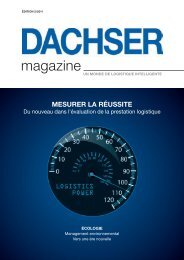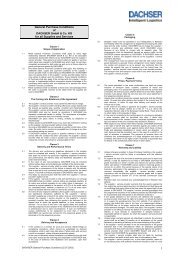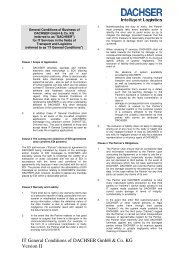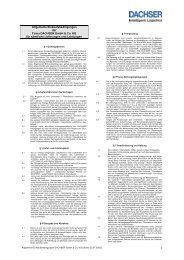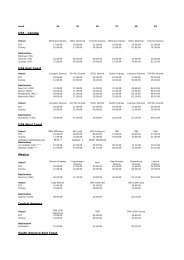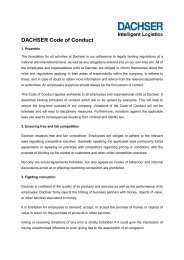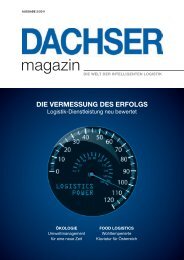NETWORKERS - dachser.sk
NETWORKERS - dachser.sk
NETWORKERS - dachser.sk
Create successful ePaper yourself
Turn your PDF publications into a flip-book with our unique Google optimized e-Paper software.
hh Mr Kunjappu, to be successful companies<br />
need creativity, gratification and<br />
inspiration. How does one generate such<br />
a culture?<br />
J. Kunjappu: A company has to show an interest<br />
in the wellbeing of its employees. They<br />
need to be able to find their identity. The way<br />
to achieve this is through respect, recognition<br />
and trust. And the mission must be important<br />
enough to give each individual the feeling<br />
they are part of the overall development.<br />
hh No one can be a constant source of<br />
inspiration within the company. What<br />
about the daily grind, the normal routine...<br />
B. Simon: Of course not every day is the<br />
same. We have to take life as it comes.<br />
With all its ups and downs. It’s therefore just<br />
as important to find inspiration in the small<br />
everyday things. For example, by constantly<br />
cooperating with colleagues and staff on<br />
solutions that I might never have come up<br />
with on my own. It’s the small things, the<br />
continuous thought processes, that give rise<br />
to creativity and innovation, not the big,<br />
one-time events.<br />
J. Kunjappu: Some employees believe inspiration<br />
should come from the top. But that’s<br />
not the management’s main ta<strong>sk</strong>. Every individual<br />
bears self-responsibility. That goes for<br />
inspiration as well. The result is a multiplier<br />
effect – because inspiration is contagious.<br />
hh Does inspiration need its own communication<br />
culture?<br />
J. Kunjappu: Communication is decisive. In<br />
the past it was important that an employee<br />
did his job. Today, he not only has to do his<br />
job, he must also constantly help to define<br />
and develop the job profile. That has con-<br />
sequences: there is no work-life balance, only<br />
a life balance. Everything I do is part of my<br />
life and enriches me. One day this may be<br />
work, the next playing football or mountaineering.<br />
I don’t make such distinctions. I<br />
don’t like the whole “after-work” concept. The<br />
business before pleasure attitude gets us<br />
nowhere. No, I enjoy myself while I am working.<br />
And afterwards as well. Put the whole lot<br />
together and what you get is inspiration.<br />
B. Simon: Understanding each individual<br />
as an integral part of the company means you<br />
won’t get the desired results if you separate<br />
business from pleasure. At Dachser, our<br />
goal is to see everyone as the individuals they<br />
are. That’s part of our culture and the basis<br />
for our success. We therefore invest a great<br />
deal of energy in creating places and events<br />
to facilitate contacts and personal exchanges.<br />
This lays the foundation for decisions that<br />
we could never reason so holistically from<br />
the top down.<br />
hh Mr Kunjappu, you made music with<br />
the Rolling Stones, one of the most successful<br />
bands in the world. What can we<br />
learn from Mick Jagger and Co.?<br />
J. Kunjappu: The Rolling Stones have been<br />
making music for the past 45 years. And<br />
they’re unbeatable. They are still the number 1<br />
and the most highly paid band in the world.<br />
The secret of their success is relatively simple<br />
and can serve as a model for companies:<br />
Mick Jagger, Keith Richards and Co. have<br />
been a fantastic team for what feels like forever.<br />
As individuals, they couldn’t be more<br />
different, and yet nevertheless they are a perfect<br />
foil for one another. Lots of people can<br />
sing, but when Mick Jagger gets up on stage,<br />
he has an amazing presence; he radiates pas-<br />
Entrepreneurs also have to inspire<br />
hhenthusiasm. Especially when it comes to convincing<br />
people that today’s recipe for success may no longer<br />
work tomorrow Bernhard Simon<br />
FORUM: DACHSER FACE-TO-FACE<br />
sion, energy, confidence and assertiveness.<br />
He is pure enthusiasm and a perfect strategist.<br />
That’s what makes the difference.<br />
B. Simon: Entrepreneurs also have to inspire<br />
enthusiasm. Especially when it comes to<br />
convincing people that today’s recipe for success<br />
may no longer work tomorrow. We continuously<br />
have to change, even if the prospect<br />
fills us with dread. If Dachser hadn’t done<br />
this over the past 80 years, we wouldn’t be<br />
here today, and couldn’t meanwhile proudly<br />
claim to be the organizer of “Intelligent<br />
Logistics” worldwide.<br />
q<br />
Branding<br />
needs passion:<br />
Mick Jagger, Keith<br />
Richards & Co. are<br />
the living example<br />
Read about the success strategy<br />
that gets the Rolling Stones<br />
“enterprise” still filling stadiums today in<br />
the full-length interview at<br />
www.<strong>dachser</strong>.com/discussion<br />
DACHSER magazine 09





